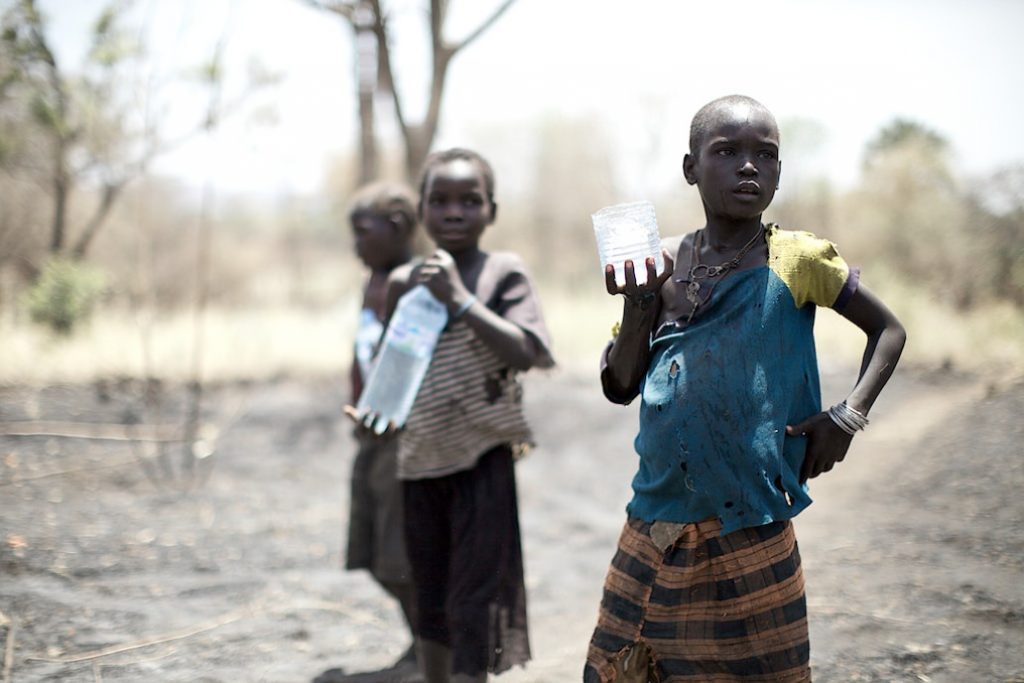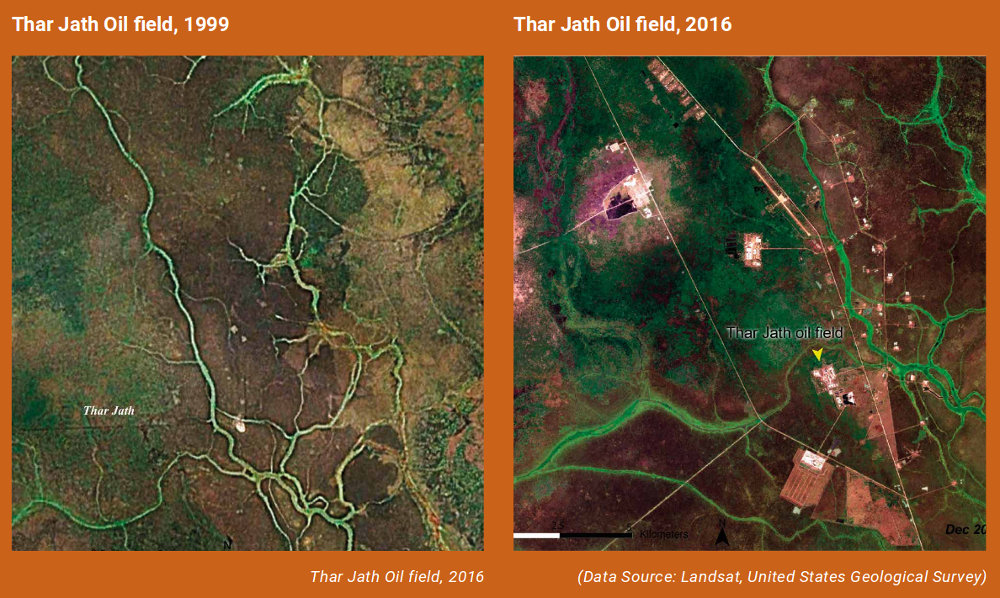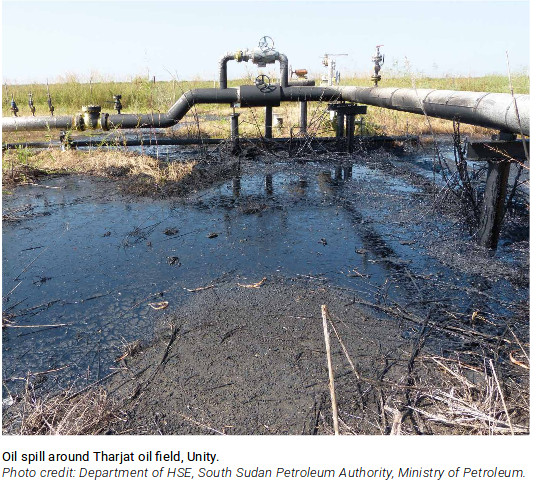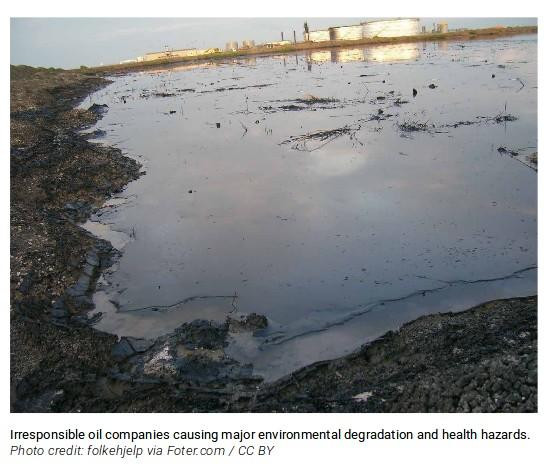MUNICH, Germany (ViaNews) - In May 2018, the United Nation‘s Environment Programme
published the South Sudan‘s First State of Environment Report and Outlook.
From literally its first page on, the report details what such environmental and human rights organizations as Germany‘s Sign of Hope have been saying for many years. The ruthless and reckless practices engaged in by South Sudan‘s oil industry have resulted in the widespread contamination of the country‘s groundwater and land, with a corresponding devastation of life, livelihood and environment.
Summary of Report
Carcinogens and other toxic chemicals and substances from oil spills, leakages and wastes are causing South Sudan to experience an epidemic of miscarriages, birth defects, neurodegeneration, cancer, cardiovascular disorders and sexual dysfunctions; and the widespread destruction of livestock, livelihoods, villages, agricultural land and habitats. This has been associated with the “economic cleansing” of oil producing areas -- the forcible displacement of more than 700,000 local residents.
South Sudan’s oil industry, its practices and their pollution-caused hunger, thirst, health damaging and poverty have thus been a prime driver of refugee flight.
The report‘s first page contains the foreword written by South Sudan‘s president Salva Kiir. Its stunning confession:
“The lack of environmental standards and guidelines to safeguard the exploration and exploitation in the extractive industry has led to pollution in the oil fields and in the surrounding areas. This trend needs to be checked through the formulation of environmental policies, standards and guidelines, and enforcement of these instruments.”
Excerpts from the South Sudan First State of Environment and Outlook Report 2018
Destruction of the Sudd, one of the world’s largest and most biodiverse wetlands, and of other habitats
"In addition, pollution from the development of the oil industry, particularly in the Unity and Upper Nile States, poses serious threats to wetlands and fisheries (MOE, 2016). For example, spillage during oil exploration and the overuse of agrochemicals threaten the Sudd wetlands with pollution and eutrophication (MOE, 2014). (Page 189)
Read: German NGO struggle for clean water in South Sudan
Oil’s poisonous spillover on to South Sudan’s environment"
"Exploration and oil drilling activities are accompanied by chemicals, drilling muds, toxic produced water and oil spills that pollute the environment in and around oil fields." (Page 255)
-
Oil wastes’ tragic toll:
- Dead livestock
- Destroyed farmlands
- Deadly water – containing lead and other carcinogens and other toxic materials
[caption id="attachment_4713" align="aligncenter" width="696"]

South Sudan girls collected water from a recently opened borehole. Water that, if contaminated, may pose a serious health threat. Photo by: Arsenie Coseac.[/caption]
"Contaminated soil and water has been an on-going concern in South Sudan’s oil fields, responsible for livestock deaths, burned grasses and trees, and unsightly open pits. An analysis of water samples taken from open mud pits near the Thar Jath oilfield in the former Unity State contained high concentrations of salts, mostly potassium chloride, implying that the drilling fluids in these mud pits were not removed after the drilling process was completed. Community water wells have also been found to contain high levels of heavy metals such as lead, which are well-known carcinogens. These are all attributed to the oil extraction activities and poor waste-disposal procedures (Cordaid, 2014)." (Page 256)
“Economic cleansing” of hundreds of thousands of residents
"Oil exploration and development activities may require the eviction of communities residing in the environment in which oil is discovered. This results in the loss of traditional livelihoods, grazing lands, ancestral homes and in many cases, sites of cultural significance. Forceful eviction has been known to happen.
For example, in 1999 when exploration first started in Block 5A in the former Unity State, there was massive displacement of the indigenous Nuer people. Then between 1998 and 2001, about 204,500 people were displaced from oil fields in Western Upper Nile (Fallet, 2010). There are other indications that almost 500,000 people were displaced from the oil-rich areas in the former Unity State between 1997 and 2003 (ECOS, 2010).
Read: Leading Rights Groups Reveal How a South Sudan Oil Company Plays a Key Role in Prolonging Conflict
One of the impacts of forced displacement is the change in land use as land that was previously used for farming and livestock is abandoned. Subsequently, oil production activities result in unplanned settlements, exploitation of natural resources, such as deforestation, and the building of new access routes. This has affected local activities and livelihood activities such as agriculture, fishing, logging and hunting. For instance, after the war in 2005, a number of villages in Melut in the former Upper Nile State were completely lost and replaced entirely with oil rigs and other geological equipment" (Page 256)
The tale of satellite photos: heavy metals leaking from pipelines and refineries poison groundwater
[caption id="attachment_4710" align="aligncenter" width="1000"]

Map of the expansion of the Jath Oil Field between 1999 and 2016. Photo by: South Sudan First State of Environment and Outlook Report 2018 (UNEP).[/caption]
"These images show the expansion of the Jath Oil Field between 1999 and 2016. The Thar Jath oil extraction plant in South Sudan's Unity state was abandoned by the oil company in late 2013. Four months later, civil war broke out across the country. Heavy metals, from leaking pipelines and refineries and damage from fighting, have leaked into the groundwater. The green color generally represents vegetation, brown: human settlements or fields, and dark blue: water." (Page 258)
[caption id="attachment_4725" align="aligncenter" width="539"]

[/caption]
Conflicts between communities and oil companies
"Conflict is also an issue at the local level of government. There is considerable mistrust between local communities and oil companies regarding the adverse repercussions of oil exploration and extraction activities, such as dispossession of land, impacts of pollution on the environment and human health, and lack of services. For instance, in Pariang County in Unity State, there are frequent conflicts between communities and the oil companies due to inadequate consultation before oil works are undertaken, creating conflict when land is possessed or houses demolished. There is also frustration when oil companies fail to build promised houses, schools, clinics or roads." (Page 258)
[caption id="attachment_4726" align="aligncenter" width="552"]

[/caption]
Oil pollutants’ deadly toll: infertility, miscarriages, birth defects and many more afflictions
"The literature indicates that pollutants from the oil extractive industry are likely to have led to emerging health problems, include-ing rising rates of female infertility, increases in the number of miscarriages, birth defects, and eye and skin problems (Cordaid, 2014); (NBS, 2014). Noxious smells and smoke are also an issue, causing discomfort and distress to people living in or close to production oil fields (Cordaid, 2014). Research shows that health workers in Melut and Koch indicate a positive correlation between these health issues and increased pollution from the oil industry (Cordaid, 2014); (NBS, 2014). A study in 2014 showed that 88.5 percent of the women in the oil-producing areas had delivered babies with birth defects (NBS, 2014). Studies in the U.S. State of Colorado indicate a correlation with proximity to oil and gas fields; and the occurrence of congenital heart defects and neural tube defects in infants (McKenzie, et al., 2014)." (Page 259)
Exposure to cancerous petrochemicals
"The Mala oilfield shows signs of pipe leakage (Nenadic & Koehlere, 2015). Oil spills from leaking pipelines, refineries or corroded or aging equipment and damage from fighting is common and has increased exposure to cancerous petrochemicals in the oil-producing areas (MOE, 2014)." (Page 259)
Carcinogens and birth defects from illegal gas flaring
"Emissions from gas flaring are also a significant environmental issue. During the mining process, gas that is produced along with the oil is flared or re-injected (WEC, 2013), although there is a law regulating against this. The emissions from gas flaring are the products of incomplete combustion. In oil field conditions, many particulates and other harmful gases are dispersed into the air. Some of these hazardous hydrocarbons include benzene, styrene, ethynyl benzene, ethynyl-methyl benzenes, toluene, xylenes, acenaphthalene, biphenyl and fluorine (Strosher, 2000)." (Page 259)
"Some of these are well-known carcinogens, while others are thought to contribute to complications in fetuses (Nikiforuk, 2014)." (Page 260)
Pollution by oil spills of farmland and of Sudd
"Soil pollution by oil spills and produced water further compounds the situation. This has been the case in Rubkona County in Northern Liech State, which lies within the Sudd wetland’s floodplain and is fertile land for agriculture." (Page 260)
Deforestation and loss of biodiversity through oil extraction
"The development of oil extraction sites requires deforestation and destroys natural wildlife habitat, contributing to the loss of terrestrial and aquatic biodiversity. As well, the dangerous and unprotected pits filled with produced water or crude oil, as well as the thousands of earth holes dug for various purposes by the oil companies, are a serious threat to the safety of the people and their livestock, and contribute to land degradation." (Page 261)
Read: Rising Health Risks in South Sudan: Radioactive and Toxic Contamination South Sudan girls collected water from a recently opened borehole. Water that, if contaminated, may pose a serious health threat. Photo by: Arsenie Coseac.[/caption]
"Contaminated soil and water has been an on-going concern in South Sudan’s oil fields, responsible for livestock deaths, burned grasses and trees, and unsightly open pits. An analysis of water samples taken from open mud pits near the Thar Jath oilfield in the former Unity State contained high concentrations of salts, mostly potassium chloride, implying that the drilling fluids in these mud pits were not removed after the drilling process was completed. Community water wells have also been found to contain high levels of heavy metals such as lead, which are well-known carcinogens. These are all attributed to the oil extraction activities and poor waste-disposal procedures (Cordaid, 2014)." (Page 256)
South Sudan girls collected water from a recently opened borehole. Water that, if contaminated, may pose a serious health threat. Photo by: Arsenie Coseac.[/caption]
"Contaminated soil and water has been an on-going concern in South Sudan’s oil fields, responsible for livestock deaths, burned grasses and trees, and unsightly open pits. An analysis of water samples taken from open mud pits near the Thar Jath oilfield in the former Unity State contained high concentrations of salts, mostly potassium chloride, implying that the drilling fluids in these mud pits were not removed after the drilling process was completed. Community water wells have also been found to contain high levels of heavy metals such as lead, which are well-known carcinogens. These are all attributed to the oil extraction activities and poor waste-disposal procedures (Cordaid, 2014)." (Page 256)
 Map of the expansion of the Jath Oil Field between 1999 and 2016. Photo by: South Sudan First State of Environment and Outlook Report 2018 (UNEP).[/caption]
"These images show the expansion of the Jath Oil Field between 1999 and 2016. The Thar Jath oil extraction plant in South Sudan's Unity state was abandoned by the oil company in late 2013. Four months later, civil war broke out across the country. Heavy metals, from leaking pipelines and refineries and damage from fighting, have leaked into the groundwater. The green color generally represents vegetation, brown: human settlements or fields, and dark blue: water." (Page 258)
[caption id="attachment_4725" align="aligncenter" width="539"]
Map of the expansion of the Jath Oil Field between 1999 and 2016. Photo by: South Sudan First State of Environment and Outlook Report 2018 (UNEP).[/caption]
"These images show the expansion of the Jath Oil Field between 1999 and 2016. The Thar Jath oil extraction plant in South Sudan's Unity state was abandoned by the oil company in late 2013. Four months later, civil war broke out across the country. Heavy metals, from leaking pipelines and refineries and damage from fighting, have leaked into the groundwater. The green color generally represents vegetation, brown: human settlements or fields, and dark blue: water." (Page 258)
[caption id="attachment_4725" align="aligncenter" width="539"] [/caption]
[/caption]
 [/caption]
[/caption]

